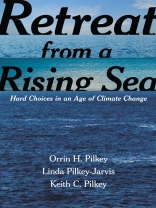Melting ice sheets and warming oceans are causing the seas to rise. By the end of this century, hundreds of millions of people living at low elevations along coasts will be forced to retreat to higher and safer ground. Because of sea-level rise, major storms will inundate areas farther inland and will lay waste to critical infrastructure, such as water-treatment and energy facilities, creating vast, irreversible pollution by decimating landfills and toxic-waste sites. This big-picture, policy-oriented book explains in gripping terms what rising oceans will do to coastal cities and the drastic actions we must take now to remove vulnerable populations.
The authors detail specific threats faced by Miami, New Orleans, New York, and Amsterdam. Aware of the overwhelming social, political, and economic challenges that would accompany effective action, they consider the burden to the taxpayer and the logistics of moving landmarks and infrastructure, including toxic-waste sites. They also show readers the alternative: thousands of environmental refugees, with no legitimate means to regain what they have lost. The authors conclude with effective approaches for addressing climate-change denialism and powerful arguments for reforming U.S. federal coastal management policies.
Spis treści
Foreword, by the Santa Aguila Foundation
Preface
Acknowledgments
1. Control + Alt + Retreat
2. The Overflowing Ocean
3. The Fate of Two Doomed Cities: Miami and New Orleans
4. New and Old Amsterdam: New York City and the Netherlands
5. Cities on the Brink
6. The Taxpayers and the Beach House
7. Coastal Calamities: How Geology Affects the Fate of the Shoreline
8. Drowning in Place: Infrastructure and Landmarks in the Age of Sea-Level Rise
9. The Cruelest Wave: Climate Refugees
10. Deny, Debate, and Delay
11. Ghosts of the Past, Promise of the Future
Bibliography
Index
O autorze
Orrin H. Pilkey is James B. Duke Professor Emeritus, Division of Earth and Ocean Sciences, at Duke University. His books include A Celebration of the World’s Barrier Islands and Useless Arithmetic: Why Environmental Scientists Can’t Predict the Future.Linda Pilkey-Jarvis is a geologist at the Washington State Department of Ecology, where she helps manage the state’s oil-spills program. She is the coauthor, with Orrin H. Pilkey, of Useless Arithmetic: Why Environmental Scientists Can’t Predict the Future.Keith C. Pilkey is an administrative law judge with the Social Security Administration. He has an undergraduate degree from Appalachian State University and a juris doctor from Wake Forest University School of Law. He is coauthor, with Orrin H. Pilkey, of Global Climate Change: A Primer.












